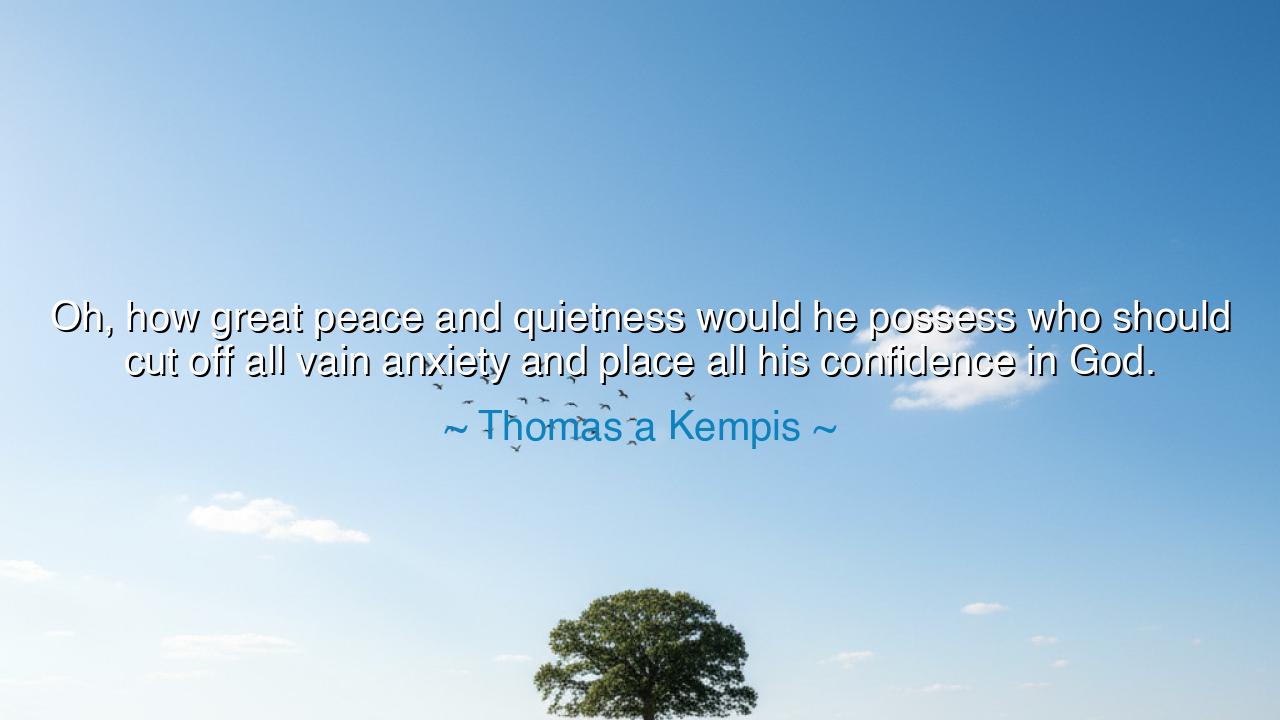
Oh, how great peace and quietness would he possess who should cut
Oh, how great peace and quietness would he possess who should cut off all vain anxiety and place all his confidence in God.






“Oh, how great peace and quietness would he possess who should cut off all vain anxiety and place all his confidence in God.” — Thomas à Kempis
In these luminous words, Thomas à Kempis, the humble monk and author of The Imitation of Christ, unveils a truth as ancient as the soul itself—that peace is not found in the abundance of worldly success, nor in the satisfaction of desire, but in the surrender of the heart. He speaks of a quietness that surpasses understanding, a stillness untouched by the clamor of fortune or fear. This peace, he teaches, is the treasure of the one who lays down the heavy burden of anxiety, and entrusts his fate not to his own strength, but to the eternal wisdom of God.
Born in the 14th century, Thomas à Kempis lived in a time of plague, war, and uncertainty—an age not unlike our own in its restlessness. Yet amid that storm, he chose the monastery, the life of contemplation and service. There, surrounded by silence, he saw that the greatest conflict was not outside but within—the restless mind that worries, plans, and frets, always seeking control. He wrote, not for kings or scholars, but for every soul that longs for inner peace. His wisdom was simple, yet profound: cease striving, trust deeply, and you shall find rest.
The essence of his teaching lies in the contrast between vain anxiety and divine confidence. Anxiety, he says, is vain because it is born of illusion—the belief that we can master what is not ours to command. We plan and worry, thinking we can bend fate to our will, but in doing so we only bind ourselves tighter in chains of fear. Confidence in God, by contrast, is freedom—the release of the soul from false mastery, the humble acceptance that the universe moves under a higher order than our own. When one entrusts all things to that higher wisdom, peace descends like gentle rain on parched soil.
Consider the story of Corrie ten Boom, a woman who lived centuries after Thomas à Kempis but embodied his teaching amid the fires of war. During the Nazi occupation, she and her family hid the persecuted in their home, and for this act of faith they were imprisoned. In the darkness of a concentration camp, surrounded by suffering, she remembered the words of Scripture: “Never be afraid to trust an unknown future to a known God.” Though she had lost everything, her heart remained unbroken, for she had cut off vain anxiety and placed her confidence in divine providence. When freedom came, she spoke of forgiveness, not hatred. Her life became a living echo of Kempis’s ancient wisdom: true peace is found not in safety, but in surrender.
The ancients knew this secret well. The Stoics called it equanimity; the Buddhists, enlightenment; the Christian mystics, union with God. Each, in their own tongue, pointed to the same eternal truth—that when man ceases to fight the river of life and begins to trust its flow, he becomes still, and in that stillness he becomes strong. To trust in God is not to abandon effort, but to purify it—to act with faith, not fear; with purpose, not panic. Faith transforms effort into peace, for it removes the poison of self-centered striving.
The lesson of Thomas à Kempis, therefore, is both tender and heroic: that the greatest act of courage is not conquest, but surrender. The world teaches us to grasp, to guard, to build, to control—but the soul finds peace only in release. To “cut off all vain anxiety” is to silence the endless chatter of “what if” and “if only,” and to rest in the assurance that what is meant will come, and what is not will pass. It is to know, in the deepest marrow of one’s being, that one is not alone in the struggle of existence—that a divine wisdom carries us even through the storm.
So, beloved seeker, take this wisdom into your own life. When you wake, begin your day not in haste, but in trust. When your plans falter, remember that your worth lies not in their success, but in your faithfulness. When fear whispers of what may come, answer it with the calm of Thomas à Kempis: “I have placed my confidence in God.” For the one who trusts thus walks through chaos with serenity, through loss with gratitude, through life itself with peace.
And at the end of all striving, when your days have run their course, you will see what he saw—that quietness is the crown of the soul, and peace the reward of faith. Then, freed from the noise of worry and the shadow of doubt, you shall rest in the eternal calm—the still heart of God, where all anxiety ends and all love begins.






AAdministratorAdministrator
Welcome, honored guests. Please leave a comment, we will respond soon